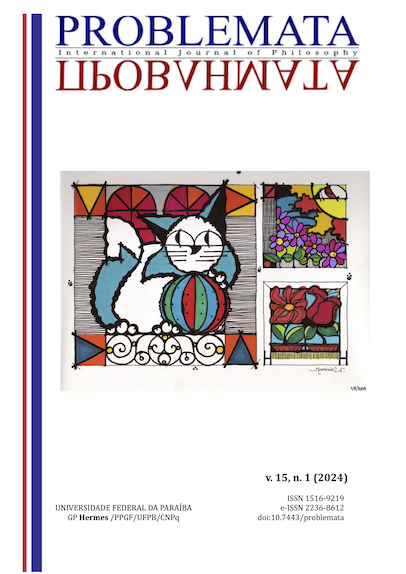MEDIA AND SOCIAL ACCELERATION:
RELATIONSHIPS BETWEEN THE TRANSFORMATIONS OF THE MEDIA AND THE PERCEPTION OF TIME IN HYPERMODERNITY
DOI:
https://doi.org/10.7443/problemata.v15i2.69695Keywords:
Media, Social Acceleration, HypermodernityAbstract
The aim of this article is to discuss the relationship between the use of the media and the production of social acceleration in Hypermodernity. This debate will be based on two fronts, Marshall Mcluhan's media theory and Hartmut Rosa's questions about social acceleration. Based on these theories, we seek to understand how the use of media affects the hypermodern human's perception of time. It is, therefore, a bibliographical review of concepts and exploratory research on these two fronts of thought, to verify the relationships between the means of communication and acceleration, starting from the hypothesis that the use of these means affects the perception of time in Hypermodernity. This theoretical crossover between Mcluhan's media theory and the concept of acceleration presented by Rosa is justified, as this vision can serve to analyze various social phenomena that stand out in hypermodern society, considering that it brings the issue of time perception closer together, with the issue of transformations caused by the use of the media.
Downloads
References
BAUMAN, Z. Retrotopia. Rio de Janeiro: Zahar. 2017.
BERNARDINO, L. G., OLIVEIRA, F. S. de, MORAES, R. de. O papel da emoção na percepção de tempo. Uma revisão sistemática do estado da arte. Cérebro & Mente: Interações, v. 14 n. 3. 2020. Disponível em: https://periodicos.ufjf.br/index.php/psicologiaempesquisa/article/view/30383.
COELHO, J. T. Semiótica, Informação e Comunicação. São Paulo: Perspectiva. 2012.
DUGNANI, P. Seriado e Aceleração: Compressão do espaço e tempo na Hipermodernidade: Série e Aceleração: Compressão do Espaço e do Tempo na Hipermodernidade. Razão e Palavra, [S. l.] , v. 27, não. 116, pág. 119–131, 2023. DOI: 10.26807/rp.v27i116.2002. Disponível em: https://www.revistarazonypalabra.org/index.php/ryp/article/view/2002.
DUGNANI, P. Hipermodernidade e a desaceleração do ritmo de vida provocada pela pandemia de Covid-19. Revista Comunicação & Inovação, v. 21 n. 47. 2020. Disponível em: https://seer.uscs.edu.br/index.php/revista_comunicacao_inovacao/article/view/7117/3190.
DUGNANI, P. Visões do Tempo: reflexões sobre as representações do tempo. Revista Brasileira de História da Mídia, VOL. 8 | No 2 | jul./dez. 2019. Disponível em: https://revistas.ufpi.br/index.php/rbhm/article/view/9266.
FILGUEIRAS, A. e STULTS-KOLEHMAINEN, M. The Relationship Between Behavioural and Psychosocial Factors Among Brazilians in Quarantine Due to COVID-19. 2020. Disponível: https://papers.ssrn.com/sol3/papers.cfm?abstract_id=3566245.
FIORIN, J. L. As Astúcias da Enunciação. São Paulo: Ática, 1996.
LIPOVETSKY. G. Felicidade Paradoxal. São Paulo: Companhia das Letras, 2007.
MATOS, O. Tempo sem Experiência. Território do Conhecimento. Youtube. 2007. Disponível em: https://www.youtube.com/watch?v=pVXl6c_MiAM&t=1880s.
MCLUHAN, M. Os Meios de Comunicação como Extensões do Homem. Cultrix: São Paulo, 2016.
ROSA, H. Aceleração e Alienação. Vozes: Petrópolis, 2022.
ROSA, H. Aceleração: a transformação das estruturas temporais na Modernidade. São Paulo: Unesp, 2019.
Downloads
Published
Issue
Section
License
Copyright (c) 2024 Patricio Dugnani

This work is licensed under a Creative Commons Attribution 4.0 International License.
Authors who publish with this journal agree to the following terms:
- Authors retain copyright and grant the journal right of first publication with the work simultaneously licensed under a Creative Commons Attribution License that allows others to share the work with an acknowledgement of the work's authorship and initial publication in this journal.
- Authors are able to enter into separate, additional contractual arrangements for the non-exclusive distribution of the journal's published version of the work (e.g., post it to an institutional repository or publish it in a book), with an acknowledgement of its initial publication in this journal.
-
- Authors are permitted and encouraged to post their work online (e.g., in institutional repositories or on their website) prior to and during the submission process, as it can lead to productive exchanges, as well as earlier and greater citation of published work (See The Effect of Open Access).





